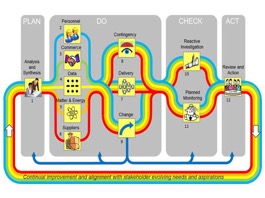 Organisations, through their structures and processes, exist to deliver a purpose. They also impact their internal and external stakeholders’ needs, expectations and aspirations positively and negatively. Ideally, they should be delivering equitable win-win outcomes across their stakeholders while making the best use of the available resources which is the principle of integrated management.
Organisations, through their structures and processes, exist to deliver a purpose. They also impact their internal and external stakeholders’ needs, expectations and aspirations positively and negatively. Ideally, they should be delivering equitable win-win outcomes across their stakeholders while making the best use of the available resources which is the principle of integrated management.
Organisations are generally naturally motivated to behave in this way because it is ethical and makes good business sense through promoting an ethical and safe business brand. Unfortunately, progress is being hampered by the reductionist fragmented management promoted by the standards, certification and discipline-based professional bodies. Change is urgently needed to support all organisations throughout the world of whatever type and size and help solve the problems that are most challenging to world leaders. The universal management system standard MSS 1000 has been specially created to meet that challenge but in so doing is a highly disruptive innovation challenging all those who have vested interests in maintaining the status-quo.
The management challenge is to direct, guide and steer the organisation in the most effective and efficient way to equitably satisfy the stakeholders whilst making the best use of available resources. To do this systematically and avoid making everything up as the manager goes along a management system is needed.
A management system is a set of formally defined intentions, principles, rules and guidance used to systematically manage an organization’s structures and processes to achieve its objectives. It typically may encompass elements such as policy statement, descriptions of management approach and philosophy, management procedure, job descriptions, work instructions, document template(s), forms, schedules, training modules, handbooks, contingency plans and process definitions. In principle, it may be unwritten but in practice it is normally formally recorded to facilitate its control, communication and review so that it can be continually improved.
A management system may be recorded and communicated using any suitable communication media or a mixture of them. It is used by an organization to control and guide its processes to consistently achieve the organization’s objectives. A management system is arguably the most important management asset of an organisation and frees up senior management to focus on the strategic the development of the organisation and ensuring that it remains aligned with the needs, expectations and aspirations of stakeholders. Like building architecture, management system architecture needs to be both functional and elegant to satisfy the users and meet the organisation’s objectives. How this is done is a key component of the organisation’s overall strategy and a critical investment affecting its future.
It must be remembered that there is nothing more difficult to plan, more doubtful of success, nor more dangerous to manage than a new system. For the initiator has the enmity of all who would profit by the preservation of the old institution and merely lukewarm defenders in those who gain by the new ones.” ― Niccolò Machiavelli
Fragmented Thinking and Behaviours
In 1994 Dr Juran stated that managing for quality must be integrated into managing the business (The Upcoming Century of Quality – ASQ Annual Congress). Indeed, all disciplines advocate that for their facet of performance to be effective it must be integrated into the overall management of the organisation. This implies that there is no such thing as separate quality management but just the quality of management. When quality is integrated into management it ceases to be a separate entity. Replicated management processes each focusing on a specific aspect of performance only emerges when management is conducted in a fragmented way for example the ISO approach to management system standards. This silo discipline based approach to management impedes a coherent focus on optimising the structures and processes that deliver the organisation’s purpose.
Dark Age of Fragmented Management System Standards
Since the publication of the environmental management system standard ISO 14,001 in 1996, which added to the existing quality management system standard ISO 9001, we have lived through a dark age of proliferating management system standards and certifications which persists to this day. It has led to multiple fragmented management system standards and certifications which collectively are not effective or efficient and indeed unfit for purpose. This dark age was created and has been sustained by each facet of organisation performance being promoted by specialist silo disciplines and narrowly focused ISO technical committees which have ignored the broader needs of organisations, line managers and other stakeholders. Indeed, the principles espoused in ISO standards such as ISO 9001 customer focus have not been executed to meet the needs of organisations.
Rise of Integrated Management Systems
However, since the turn of the millennium and in stark contrast to this dark age of proliferating management system standards and certification, we have seen the emergence of partially integrated management systems covering health, safety, environment and product/service quality (HSEQ). Research has confirmed that this has been initiated by organisations and not orchestrated by standards, certification, professional or academic bodies – [A survey analysis of integrated management systems in the UK – Agnieszka Katniak]. Organisations have used their intelligence and creativity to deliver their purpose through more joined up management thinking. This has been a major paradigm shift in management thinking which the CQI Integrated Management Special Interest Group (IMSIG) believe will continue into a second phase over the next decade driven by organisations needing to be more effective and efficient. While integrated management systems addressing health, safety, environment and product/service quality (HSEQ) have now become commonplace we will next see more fully integrated management systems without boundaries addressing the management of all aspects of the organisation and its interaction with others. The benefits already experienced by organisations will be further amplified. Intractable problems facing the world desperately need the application of joined up management thinking.
Antidote to Fragmented Management System Standards
As an antidote to multiple standards, multiple certifications and fragmented approaches to management, IMSIG has created a free universal management system standard MSS 1000 that promotes fully integrated management systems without boundaries. It not only avoids having to use the proliferating ISO management system standards but goes further and addresses the management of personnel, overall security and commercial processes. It permits three levels of compliance depending on the maturity of the organisation. Bronze level addresses the basic functionality of the normal, contingency and change processes that deliver the organisation’s purpose. Silver level requires the demonstration of commercial responsibility in its agreements and contracts with internal and external stakeholders. Gold level requires a demonstration of social responsibility.
 MSS 1000 transcends silos and fragmented management approaches allowing disparate disciplines to jointly own and cooperate in the creation of an integrated management system fully focused on optimally delivering the organization’s purpose through its normal, contingency and change structures and processes rather than attempting to independently manage multiple dimensions of performance.
MSS 1000 transcends silos and fragmented management approaches allowing disparate disciplines to jointly own and cooperate in the creation of an integrated management system fully focused on optimally delivering the organization’s purpose through its normal, contingency and change structures and processes rather than attempting to independently manage multiple dimensions of performance.
One fully coherent organisation equitably satisfying its stakeholders while making the best use of resources.
One fully integrated management system without boundaries addressing the totality of the organisation and its interaction with others.
One universal management system standard supporting fully integrated management systems and one certification.
Paradigm Global Disrupter
The widespread adoption of MSS 1000 can make a significant contribution to global economic, social and environmental performance and its sustainability. For an organisation. the bottom line is that implementing MSS 1000 will significantly improve:
- Enhanced stakeholder satisfaction while making the best use of resources,
- Personnel performance, stress reduction leading to greater team and organisation coherence,
- The effectiveness, efficiency and control of the organization’s structures and processes,
- Prospect and risk management,
- Commercially responsible and socially responsible performance,
- Greater organisation robustness, agility and resilience,
- Enhanced competitiveness, profitability and resilience.
There is no doubt that MSS 1000 is a highly disruptive innovation that can bring enormous benefits to organisations of all types and sizes wherever they exist in the world. However, many wish it had never been created and see it as a major threat to the existing ISO management system standards and certification industry which have invested an enormous amount in delivering fragmented products and services. Just as the canals were threatened by the railway and road transport innovations there are many with vested interests in maintaining the status quo and impeding the much-needed progress that can benefit organisations and society. But, just as organisations took the lead in the past decade they can take the lead in the coming decade by demanding single certification of their integrated management system against MSS 1000. Change will inevitably happen at some point but why should organisations delay much needed performance improvements, enhanced problem solving and win-win outcomes?
Information
MSS 1000 Free Download and Use
The universal management system standard MSS 1000 was created by an international team of volunteer experts, a budget spend of zero and may be freely downloaded via http://cqiimsig.wixsite.com/imsig/mss-1000
If you have found this article thought provoking and informative you may also like to read the LinkedIn Impulse article ’The World’s first Universal Management System Standard’
Anyone interested in joined-up thinking approaches to management, referred to as integrated management, is very welcome to join the LinkedIn Integrated Management Special Interest Group – it has an international membership and is not restricted to CQI members.